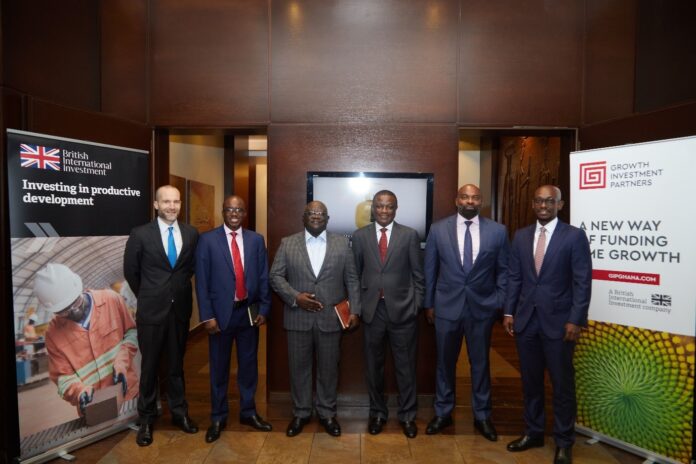
British International Investment (BII), the UK’s development finance institution (DFI) and impact investor, has introduced an innovative initiative called Growth Investment Partners Ghana (GIP) in a bid to unlock the economic potential of local businesses.
The new investment company, with an anchor commitment of up to US$50million, aims to provide patient flexible capital – primarily in local currency – to support the growth of small and medium-sized enterprises (SMEs) in the country.
Chris Chijiutomi, MD and Head of Africa at BII, unveiled the ambitious project during the Media Parley Speech. He highlighted the significance of GIP, which goes beyond typical fund investment horizons, enabling BII to establish a long-term partnership with Ghanaian businesses.
“As one of our priority markets, we have huge ambitions for our investment in Ghana; and we want to go further to help entrepreneurs and businesses,” said Mr. Chijiutomi.
“GIP is a unique and lasting solution that addresses significant gaps and barriers, providing long-term funding to support business growth and recovery from macroeconomic headwinds,” he added.
SMEs occupy a critical role in the economy, accounting for over 90 percent of business enterprises as well as 60 percent of the country’s GDP and 80 percent of all employment. Despite their importance to the economy, the SME financing gap is estimated at US$4.8billion – one of the largest in Africa.
SMEs face many challenges accessing growth capital through traditional funding sources, including high-interest rates, short-term loans, high collateral requirements and currency mismatches. Compounded by a challenging macroeconomic environment influenced by the global pandemic and geopolitical conflicts, SMEs in Ghana need access to long-term growth capital and business support designed to boost their growth, create jobs, and deepen their contributions to the Ghanaian economy.
GIP is poised to become a game-changer in Ghana’s business landscape by offering flexible capital ranging from US$500,000 to US$5million, primarily in local currency, with flexible repayments linked to revenue and cash flows.
GIP says its investment tenor will be between five to 10 years, depending on the specific needs of the business.
Albert Essien, Chairman of Growth Investment Partners Ghana Ltd. (GIP), emphasised the importance of supporting credible businesses and adopting sound practices critical for productive, sustainable and inclusive growth of SMEs.
He said: “GIP will not only provide funding, but also offer non-financial support in areas such as corporate governance, environmental practices and financial management to ensure the success of the businesses it supports”.
Jacob Kholi, Chief Executive and Investment Officer of GIP, shared insights into the objectives and functioning of the investment company. He explained that GIP would offer a range of financial products tailored to meet the growth needs of SMEs, bridging the gap in accessing adequate and appropriate finance for their development.
“GIP’s capital structure is permanent, allowing for a patient focus on the long-term growth of businesses,” said Mr. Kholi. “It will assess the long-term earning potential of SMEs rather than solely relying on their short-term track record and collateral capacity,” he stated.
To be eligible for GIP funding, businesses must meet at least two of the following three criteria: turnover up to the local currency equivalent of US$15million, total assets up to US$15million in local currency equivalent, and employees ranging from 10 to 300. The businesses must be incorporated and have their main operations in Ghana, with at least 50 percent of revenues generated from operations within the country.
Additionally, they must fall within permissible sectors not on BII’s exclusion list, which largely comprises industries that negatively affect the environment.
“GIP’s focus on long-term partnerships and localised investments sets it apart from conventional investment vehicles,” said Mr. Kholi.
He added that: “This pioneering approach aims to make a lasting impact on the Ghanaian economy and create an ecosystem where SMEs can thrive”.
As GIP launches its operations in Ghana, led by a team of highly experienced local investment professionals, it holds the promise of transforming the SME financing landscape and contributing to the sustainable growth of local businesses. With an ambitious plan to replicate its success in other African countries in need of long-term flexible growth capital, it is poised to become a beacon of hope for the continent’s entrepreneurial ecosystem.









